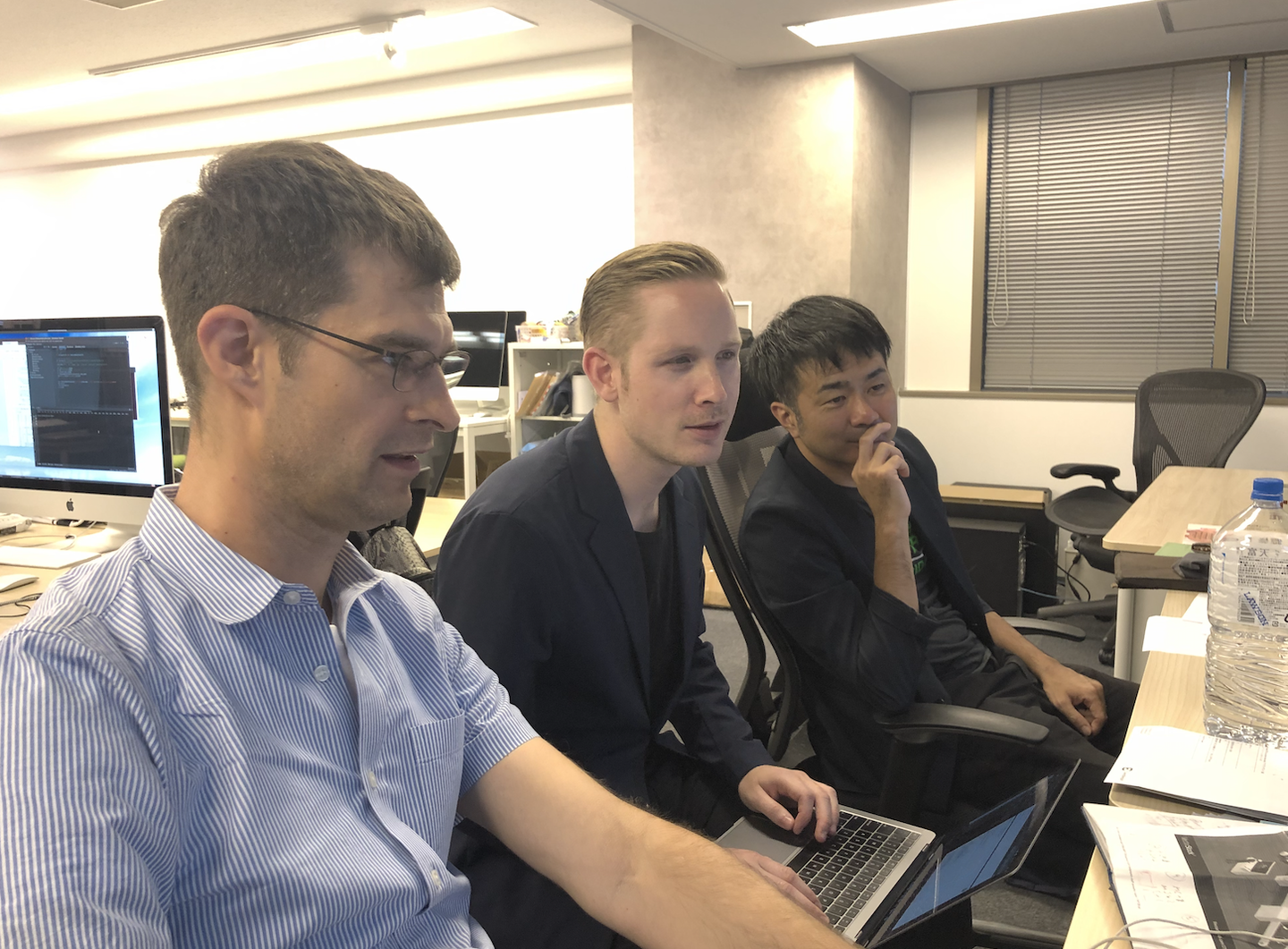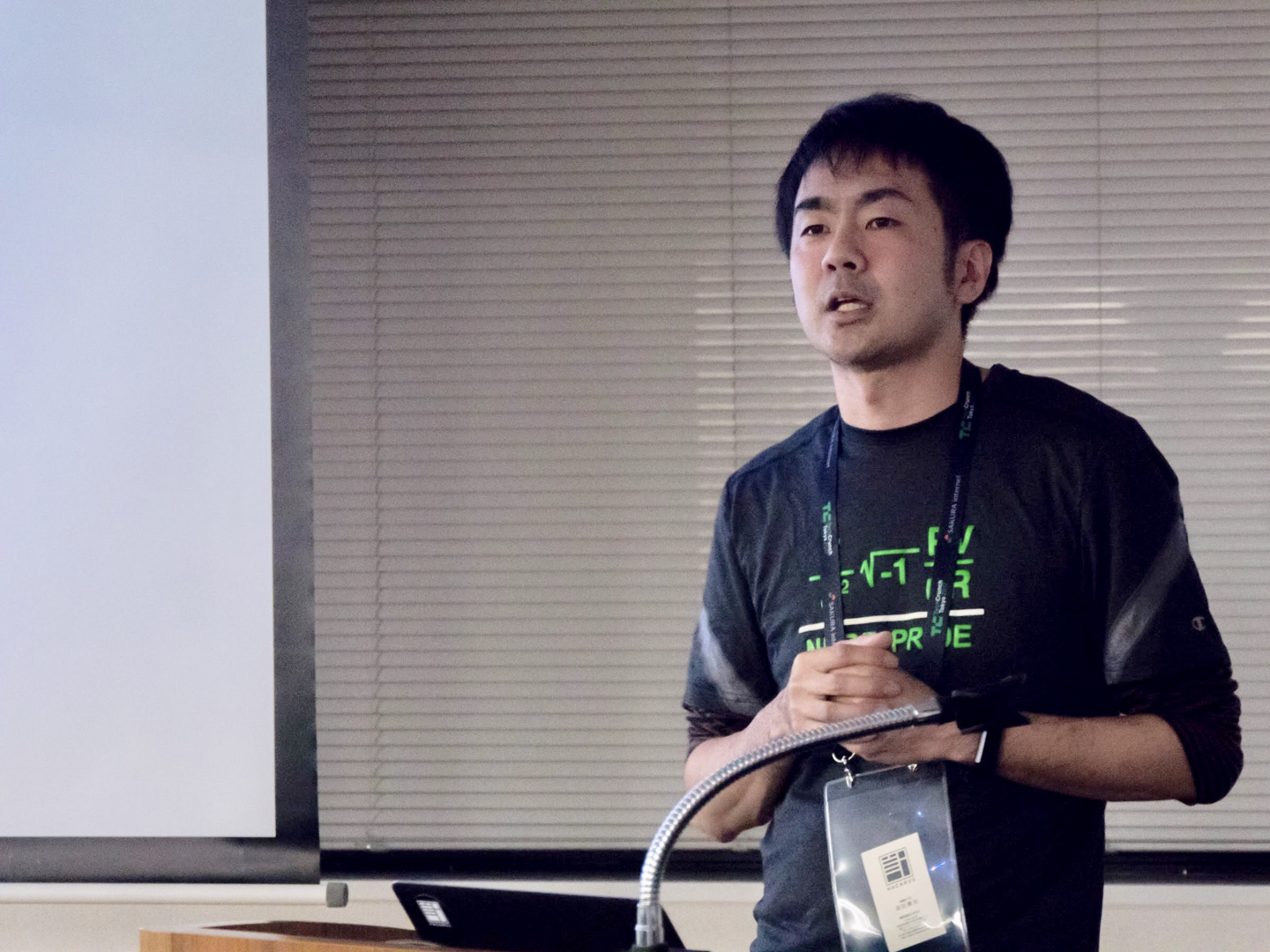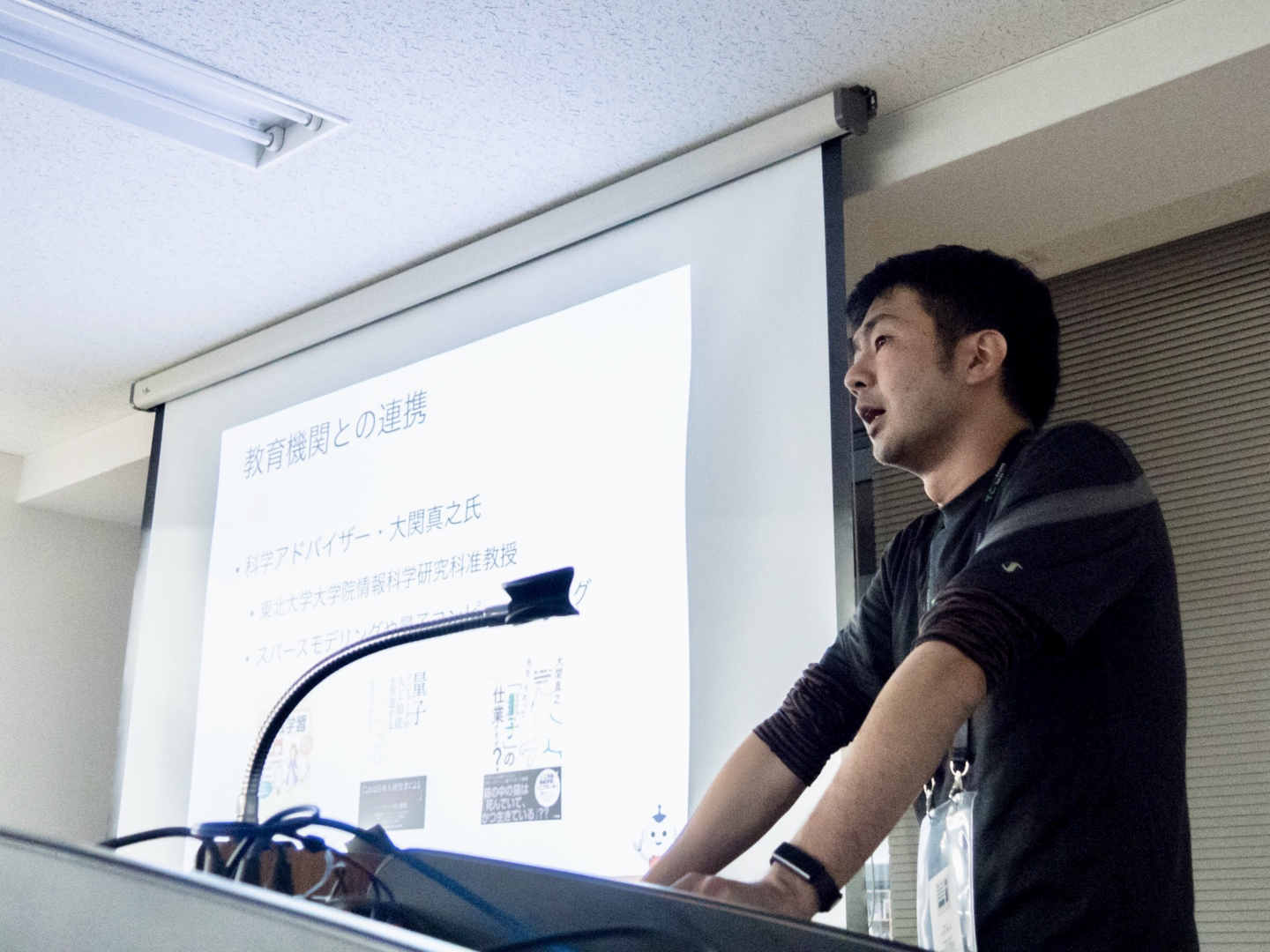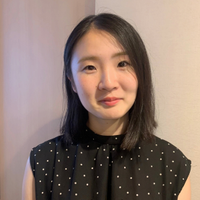Hacarus, an AI startup located in Kyoto, employs people from remote areas including members from the Philippines, Sendai, and Central Kyoto. Hacarus has a total of three employees who all formerly served as Chief Technology Officers (CTO).
What was the reasoning for former CTOs to launch Hacarus? Why did they take part in developing Hacarus?
This time around I’ll be interviewing Someda-san, the CTO of Hacarus!
Someda-san has experienced working as a CTO in prior to Hacarus and although in a different field, he has engaged with data analysis before.
Tomomi: You’ve been with Hacarus since 2016, is that right? Could you tell us about your work experience prior to Hacarus?
Someda-san: After graduating from my master’s university, I worked at Sun Microsystems and took part inspecting system performance using a refrigerator-like high-end server and storage aimed towards clients in several parts of Asia. Along with that, I’ve also experienced tuning Solaris/Java/Oracle software environments.
When I worked at Sun Microsystems, I was selected to work with unprecedented software creation projects. From then on, I became completely immersed in product development. These days were the days of Seasar and Java. These communities helped serve as the motivation for me to aspire to be an astounding engineer and venture manager as well as connect with various people.
After completing the project, I joined a venture company. While in that company, it achieved being listed on the stock exchange. Witnessing that myself, I became compelled to do the same thing myself. From that then on, when I turned 30, I launched an e-Learning based venture as co-founder CTO.
Tomomi: And that was your first experience as a CTO, correct?
Someda-san: Yes. After stepping down from that venture, I took part starting up a business in a Kyoto branch, Fukuoka-based venture that developed project management tools. In that time, I experienced from start to end the entire process of frontend to backend application development from OS and middleware as well as a construction environment application called AWS employing an engineer-like point of view (like a jack of all trades?) which I find to be balancing. Also, at this company, I took up activities of what we call, a technical evangelist. An engineer with experience in shouldering growth hack, marketing, and business scale missions might not be all that rare.

Tomomi: Nowadays, “growth hack” has become such a buzzword that perhaps around 2012 it came into conception in Japan. You challenged quite leader-like roles! I suppose that you joined Hacarus after that time. When did you encounter Hacarus?
Someda-san: I’ve had my mind on the venture industry in Kyoto for a long time, so I knew CEO Kenshin since before. When I heard the news that Kenshin, who had bought out Startup Weekend’s Coworkify, was starting up a new IoT venture company called Hacarus- it came very naturally to me.
Right when I left my last job, Hacarus was hiring for an engineering position. From there on, a mutual acquaintance acted as a middleman to formally introduce me to Kenshin and we had a casual conversation over a beer. On the way home, I was suddenly asked, “Someda, might you have an interest in a CTO position?” and although I was taken aback by this, I decided right then and there, I wanted this.
Tomomi: So that’s how you became CTO! What made you interested in the field Hacarus was working on (AI and sparse modeling, python etc.)? It wasn’t that you were narrowing your interests based on your experiences, was it?
Mr. Someda: That’s right. I was at the age of 40 when I felt that it was the right timing to change jobs, so I decided to use what I had experienced in the past until now, to challenge new things. Amongst these things, before I actually joined Hacarus, I already had interest in that Hacarus was founded and based on healthcare and thought at that time I could make my own weight management application. In addition to that, until that time I was mainly making engineer targeted services, so I wanted challenge developing services for users.
Incidentally, when I was an informations student, I would implement statistical approaches in noise canceling research, estimating the degree of difficulty in a problem from response tendencies at an e-learning venture. At my last job, I engaged in understanding user activity from data analysis. Which is why even though it isn’t exactly the centerpiece of AI, I periodically deal with a field in AI based technology.

Overcoming the struggles and constant changes in a startup
Tomomi: How did you feel when you first began your journey as CTO of Hacarus? You talked about it a bit in your blog, “That’s a Startup-typical First Year”. Could you tell us more?
Mr. Someda: Hacarus’s company structure the first time around was composed of half of the development team abroad doing remote work, the rest of the half of workers were external partners, and at the office- it was just me. I ran into quite a few issues in the beginning. Difficulties occurred in being understood in areas I thought was ordinary so there were sometimes communication problems. The time for launching was gradually drawing near so I was frantic literally having sleepless nights.
Because I was so familiar with everything dealing with development processes from my previous job, I would frequently skip over explanations. For example, in the development processes, many times tickets were not cut before the development task would begin. I thought that it was natural that developers voluntarily do task division and registration of tickets after agreeing to a rough task to a certain extent, but I learned that the premise differs depending one’s environment and experience.
Also, because both the development teams from the Philippines and members from external partnerships at that time were all 10 years younger than I, there were some practices in development process they have not experienced before like infrastructure as code or continous delivery.I thought to myself, “It would be difficult to understand if you don’t experience it yourself” and decided to change gears then go forth in a more realistic and reasonable manner.
I felt that having careful communication and accumulating trust little by little would come naturally as long as we collaborated.
Tomomi: I think a startup has an environment that is surrounded by large changes. And as a startup, Hacarus has also had many changes until now. When those changes occurred, what was your mental state at that time? I’m guessing you had to make many difficult decisions.
Mr. Someda: Current AI/data analysis operations were not established in Hacarus’s beginnings. However, while listening to client sentiments during sales activities, I would think to myself, “this might be something we could do in our business” and would use this as motive to expand our current operations. Initially, we came to inquire about making a web page explaining our services and introducing it in various places little by little. While comparing the inquiries and reactions of our customers with the existing business, I was asked by 7 or 8 clients enthusiastically asking questions at a business meeting about data analysis. At that moment, I strongly felt the discrepancy of needs.
As business changes, the roles of members would change as well so it wasn’t easy at the time. However, as traditional as it may sound, we decided to focus on the current business and think about how we can grow as a venture company while delivering value to our customers.

Every experience lives on within us. And they weren’t in vain.
Tomomi: Is there a big difference from your experience as CTO then and now? Since it’s your second time now, do you have much more composure than you had back then?
I think the difference is, I’ve been hit hard and learned how to handle obstacles and as a result, became stronger. As a venture, change becomes a part of your everyday routine. With that comes the strength and challenges to believe in your team and in the technology. Because of that, I am unafraid of coming to the conclusion where I’ll say “I don’t understand” and take a step back and believe instead that “I’m going to quantum leap at some point”. This is the big difference. The first time around I felt I was drifting about with serious feelings.
Tomomi: When you look back at difficult experiences, do you ever come to think “I’m glad I experienced this”?
Mr. Someda: During my days as a student, I fully developed a business system of two companies with a friend of mine. I was too immature at the time which made things difficult. Eventually, I overcame the difficulties and the system that I had developed continued to be used by the company for several years until its renewal. Even then, these days where I couldn’t sleep went on, and although it was tough, I believed “something will work out”.
In addition, at my last job, when I was entrusted with development of my main project I witnessed the product’s growth and product change into a company. The fact that I had experienced that is one of my personal assets.
Through continual persistence in my performance and in projects, I came to believe that a breakthrough will come through.
Tomomi: While new business and business development often end without waiting for a breakthrough, it must have been a valuable experience. So, what is the merit of joining Hacarus?
Mr. Someda: The merit comes from not just learning about technology, but learning about making company culture, making the process, and building the foundation of the company. Since there are few people in the company, as long as you have the courage, you can challenge a lot of things.
Also, as a venture, there are many staff over 40, including myself. This means you can receive suggestions and ideas based on experience, something younger members of a venture cannot do. You might find a lot of things to appreciate here at Hacarus.
Thank you so much for today!
/assets/images/260916/original/3f3349c3-cad0-4ed8-8372-b191c2e08205?1519625354)
/assets/images/260916/original/3f3349c3-cad0-4ed8-8372-b191c2e08205?1519625354)
/assets/images/260916/original/3f3349c3-cad0-4ed8-8372-b191c2e08205?1519625354)
